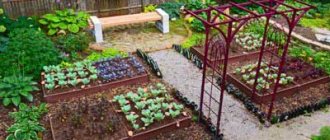Home / Real estate / Land / Categories of land / Agricultural land
Back
Published: 11/02/2017
Reading time: 10 min
3
898
Land plots intended for agricultural activities may have different purposes, which determine the types of permitted use of such plots. Possible activities on plots for gardening depend on the category of land to which they belong and the zonal distribution in the area.
- Vegetable gardening and horticulture
- Plots for gardening
- How to transfer a plot for gardening to individual housing construction?
- Documentation
- Procedure algorithm
- Changing the VRI of a city site
- How to register land ownership?
- Conclusion
Vegetable gardening and horticulture
Legal regulation of lands intended for gardening and vegetable farming is carried out:
- Land Code of the Russian Federation;
- Law No. 66 “On gardening, gardening... associations of citizens.”
Plots with the designated purpose of “gardening” are intended for growing various agricultural crops and for the construction of permanent residential buildings, according to Art. 1 Federal Law No. 66.
plots , unlike garden plots, are intended only for growing agricultural plants. The construction of permanent housing on garden plots is prohibited; only the installation of temporary cabins and auxiliary buildings without a foundation is possible.
Is the dacha residential or non-residential premises?
Is a country house still residential or not, is it possible to register in it? This question is asked very often, and here is what the legislation says about this.
As we have already said, on a summer cottage, if it is located on the territory of SNT, you can build a residential and garden house.
House
According to the Town Planning Code of the Russian Federation dated December 29, 2004 N 190-FZ, a residential building is a separate building (less than three floors high and up to 20 meters). Inside the residential building there are rooms and other auxiliary premises. The house cannot be divided into separate objects and its main criterion will be its purpose for living.
garden house
A garden house, as defined by 217-FZ, is also intended for living, only temporarily, during the season. The law also provides that a garden house can be converted into a residential one and vice versa.
In order to be able to register in a house, you must declare it as residential. If previously, the house was registered in the cadastral register, and its purpose is residential, then the possibility of living in it has been documented, but if your house is of good quality, all conditions for living have been created in it, and according to the documents it is listed as non-residential, then, if necessary, it can be make it residential. To do this, you need to contact a cadastral engineer, prepare a technical plan for the house and collect the necessary documents for its registration with the Rosreestr authorities.
A cadastral engineer prepares the technical plan for a residential, garden house and other buildings, as well as the boundary plan for a summer cottage plot. To calculate the cost of services and select the most cost-effective cadastral organization, we suggest using a free online service - a cadastral services calculator in your region.
Plots for gardening
Vegetable gardening is one of the types of permitted activities on land plots belonging to the category:
- Agricultural land;
- Lands of populated areas.
Plots for gardening can either belong to citizens as property rights, or be provided to them by local municipal authorities on a long-term lease.
Many garden lands are owned by citizens on the basis of perpetual use or lifelong ownership.
According to the All-Russian Classification of Types of Permitted Activities, in areas with a designated purpose, gardening can be carried out:
- Growing vegetables and potatoes;
- Growing melons;
- Growing berries and fruits;
- Construction of non-permanent outbuildings;
- Installation of temporary cabins for living without a foundation.
Growing perennial fruit trees (apple trees, pears, etc.) on a garden plot is not allowed.
It is important to take into account that the construction of temporary buildings is possible only on plots for gardening that belong to the lands of urban settlements if there is an appropriate zonal distribution. On field sites classified as agricultural land, the construction of temporary housing is prohibited.
Citizen's rights when purchasing a garden plot
The legislation clearly defines the rights of the owner, which is expressed as follows:
- The harvest from growing agricultural crops is the property of the owner. He has the right to dispose of it at his own discretion, for example, to use it exclusively for personal purposes or sell it in full or in part.
- He has the right to grow agricultural crops throughout the site (crops that are not prohibited by law).
- The owner has the right to build outbuildings, residential facilities or other structures that do not conflict with the purpose of the site.
- If there is a desire to increase soil fertility, then reclamation, plant and other manipulations can be carried out that will change the quality of the land. But it is important to ensure that this does not affect areas owned by neighbors.
- The owner has the right to make transactions permitted by law, for example, to sell the land, transfer it as collateral, donate it, bequeath it in accordance with the provisions of inheritance law, that is, by duly executing a will.
- If mineral resources are discovered on the territory, then, in accordance with the law, the owner can use them, but only for personal purposes. The law does not allow the sale of minerals without obtaining permits.
How to transfer a plot for gardening to individual housing construction?
A plot for housing construction (IHC) involves the construction of a residential building of up to 3 floors for living and growing crops, including perennials.
Plots for gardening are transferred to individual housing construction in order to be able to build permanent housing and other buildings (garage, barn, etc.).
There are two ways to transfer a plot for gardening to individual housing construction:
- Changing the category of a plot to land in settlements (for agricultural plots for gardening);
- Changing the type of permitted use (AUR), if the site belongs to settlement lands.
Only participants in peasant farming can build housing on agricultural land. Such participants must produce agricultural products and pay tax on their sales.
If the owner of garden land of the agricultural category does not plan to actively engage in agriculture after building a house, it is better to transfer the plot to the category of settlement land and immediately request the necessary intended purpose - construction of housing. It is important to take into account that it is possible to change the category of a plot for agriculture to settlement land only if such a plot borders the given settlement.
Documentation
To transfer land from the agricultural category to land in populated areas, an individual will need the following documents:
- Cadastral passport;
- Extract from the real estate register on the ownership of the plot;
- Results of environmental assessment;
- Copy of the passport.
An environmental assessment is ordered from the regional environmental management department and completed within 2-4 months.
An extract from the Unified State Register and a cadastral passport can be ordered from Rosreestr or a multifunctional center by paying a state fee of 300 rubles for the extract and 700 rubles for the cadastral document.
Procedure algorithm
The land category is changed in the following order:
- The owner of a plot for gardening collects the necessary documents and writes a petition to the regional land committee of the executive branch;
- The Land Committee considers the application (60 days);
- Based on the results of the consideration, a decision is made to transfer the site to the category of urban land or to refuse;
- A copy of the act of the authorities’ decision is sent to the applicant and to Rosreestr for entering information about the new category of land in the Unified State Register of Real Estate.
When filling out the application, the applicant indicates the reasons for changing the category of land (the need to build housing), and justifies the legality of the procedure.
You should also indicate the preferred purpose of the site (individual housing construction) and the type of permitted land use (low-rise housing construction).
A positive decision will be made under the following conditions:
- The cadastral price of the plot indicated in the application does not exceed the average for the subject of the federation by more than half;
- The site is not classified as valuable agricultural land;
- There is no legislative ban on changing the category of land in a given territory;
- The Environmental Commission authorized the transfer of land based on the results of the examination.
If the transfer of land is refused, the applicant is given a written list of reasons signed by an authorized person. After receiving a copy of the act on changing the category of land, the applicant can begin construction of housing.
Responsibilities of the owner of a garden plot
As in the vast majority of transactions, the purchase of a plot of land implies not only the emergence of the rights of the owner, but also the presence of responsibilities. They are as follows:
- Preservation of boundary and geodetic markings that are installed within the site. Moving them either individually or with the consent of neighbors or third parties is not allowed. Only those marks that were placed under state control remain official.
- Respect for the interests and legal rights of owners and tenants.
- Use of the territory in accordance with its purpose and not for other purposes.
- Providing information to the competent authorities, which is required to correctly fill out the cadastre.
- The timely payment of monies required by law, such as taxes or rent.
This is not a complete list of responsibilities. They are described in more detail in the Land Code of the Russian Federation, Article 32. Before concluding a transaction, you must read their full description, and also be aware of your responsibility both to the state and to other people, be they neighbors or tenants. The law establishes administrative and other penalties for people who do not comply with all the requirements specified in the code and other regulations.
Changing the VRI of a city site
If the plot for gardening belongs to urban lands, then in order to change its permitted land use to low-rise personal construction, you must contact the city administration with an application, in the text of which indicate:
- Full name, passport and contact details;
- The need to change the permitted land use for construction;
- Current and desired VRI;
- Land category;
- Address landmarks of the site and its cadastral number.
After accepting the application, the authorities will schedule public hearings, to which neighboring land users will be invited. Based on the results of the hearings, the decision to change the VRI of the site for vegetable gardening will be made by the commission based on the development plan for the urban area and the comments made at the hearing.
All expenses for organizing public hearings are at the expense of the applicant. The decision to change the VRI of the site must be made by the commission within 30 days after announcing the date of the hearing.
If the commission’s decision is positive, an act on changing the type of land use of the site up and appropriate changes are made to the Unified State Register; if refused, the applicant can challenge the commission’s decision in the judicial authorities (Clause 12, Article 39 of the Civil Code of the Russian Federation).
How to register land ownership?
If the land for gardening is in a non-profit partnership, then it can be registered as ownership free of charge if the city authorities provided the territory to this partnership before October 2001. To register a plot of land, you will need the following documents:
- Certificate of right to use the site (membership in a partnership);
- Cadastral document;
- Copy of Russian passport;
- An extract on the presence of encumbrances from the legal register.
In the absence of a cadastral passport, it is enough to draw up a diagram of the boundaries of the plot and have it certified by the management of the gardening partnership to which the plot belongs.
A certificate of encumbrances can be ordered at the MFC by applying with a passport and paying a fee of 300 rubles.
With these documents, you must contact the municipal land management department and write an application for the provision of ownership of a plot for gardening.
The text of the application begins with the name of the appeal body and the full name of the official. Authorized person to consider such applications.
Next, the applicant introduces himself, indicates his passport and contact information, after which he sets out a request for ownership of a plot for gardening, and indicates information about the plot:
- Address landmarks;
- Cadastral number;
- Land category;
- Square;
- Type of permitted land use;
- The type of right under which the land is exploited.
The application is considered within a month, during which employees of the land management department make a decision on whether to provide ownership of the plot for gardening or to refuse it.
If the plot is not demarcated, the land department preliminarily agrees on the transfer of ownership of the plot, after which it initiates cadastral work to establish boundaries and issues a cadastral passport for the plot. All demarcation costs are paid at the expense of the administration, in accordance with Art. 12 Federal Law No. 93 (law on “dacha amnesty”).
After the decision to provide ownership of a plot for gardening, the applicant submits a copy of this decision to the MFC, attaching to it :
- Cadastral passport;
- A copy of the Russian passport;
- Receipt of payment of the fee (100 rubles).
10 days after contacting the MFC, information about the owner of the plot for gardening is entered into the unified real estate register. If it is necessary to confirm ownership of a plot, the owner can order an extract from the Unified State Register of Real Estate from Rosreestr or the MFC.
VTB 24 mortgage - how profitable are their offers? You can read how to correctly register ownership rights in our article.
You can learn about all the nuances of allocating a share from common property in our thematic article.
Permitted activities
According to land legislation, the direct purpose of an allotment that has a VRI “Vegetable gardening” is:
- growing vegetable and fruit and berry products for own needs;
- people's recreation;
- construction of outbuildings for the purpose of use - storage of equipment, as well as crops collected from the site.
Conducting economic activities on lands allocated for gardening can be carried out individually , as well as through the creation of partnerships and other associations of land owners.
Within the framework of SNT
Membership in an association created by citizens for the purpose of joint ownership and use of garden plots and other property in their common ownership has the following advantages :
- Assistance in connecting the necessary communications - electrical networks, gas and water supply networks, sewerage.
- Solving the issue of solid waste disposal by concluding an agreement with a regional waste management operator.
- Ensuring fire safety of the territory.
- Land improvement and protection.
- Assistance to citizens in the development of allocated land plots.
- Interaction with authorities and regulatory structures.
- Legal assistance to protect the legitimate interests and rights of citizens.
On lands allocated for vegetable gardens, it is prohibited :
- construction of a residential building;
- registration at the place of residence;
- carrying out activities that disturb the fertile layer of the earth.
If a plot located on agricultural land is not used in accordance with its purpose, it may be alienated from the owner in court.
Owners of a plot located on the territory of a gardening partnership do not have the right to :
- demand the allocation in kind of your part of the land from the volume of public real estate;
- alienate one's land share to provide it to another person without transferring ownership rights to it.
The legislation does not require registration of outbuildings erected on lands with the VRI “Vegetable gardening”.










